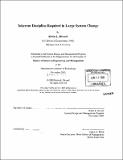Inherent discipline required in large system change
Author(s)
Rivard, Robin L
DownloadFull printable version (8.462Mb)
Other Contributors
System Design and Management Program.
Advisor
Janice A. Klein.
Terms of use
Metadata
Show full item recordAbstract
Recent electrical architectures of land vehicles have shown a marked increase in networking and integration of electronic controls into traditionally electro-mechanical devices, which results in complex functional interactions throughout the electrical system. This trend often drives a large system change that modifies the engineering roles of the component level engineer and also creates a need for an evolution to a vehicle level systems engineering approach. In this paper, a claim was put forth that without a certain level of inherent discipline in place and functional, no successful large system change can occur. Inherent discipline was decomposed into three parts: process, personal, and organizational disciplines. Each of these was described and relationships between them were investigated. The correlation between parenting and organizational discipline was explored. A case for the business value of inherent discipline was made by examining two examples; one of organizational progress and one of manufacturing progress. Then a case study of an emerging large system change, feature ownership, was presented. Details on the engineering roles required for feature based development at each of the hierarchical levels of the electrical system were presented. (cont.) Using the Design Structure Matrix as a tool, the interactions of the development process used for implementing distributed features were analyzed. Elements of inherent discipline required for a successful implementation of feature ownership were identified, as well as feedback from engineers in the organization implementing this large system change. The criticality of organizational discipline, in particular, to the feature ownership change initiative was emphasized. Recommended next steps for process, personal, and organizational discipline were detailed and possible effects of lack of discipline on feature ownership were postulated. The three types of discipline form a balance for the large system change initiative. The absence of any of the three can have a detrimental effect on the progress and effectiveness of the change, leading to poor quality, application or implementation of the change.
Description
Thesis (S.M.)--Massachusetts Institute of Technology, System Design and Management Program, February 2006. Includes bibliographical references (p. 90).
Date issued
2006Department
System Design and Management Program.Publisher
Massachusetts Institute of Technology
Keywords
System Design and Management Program.